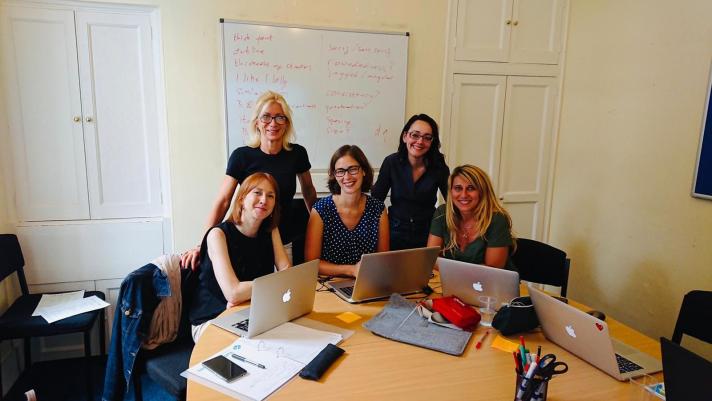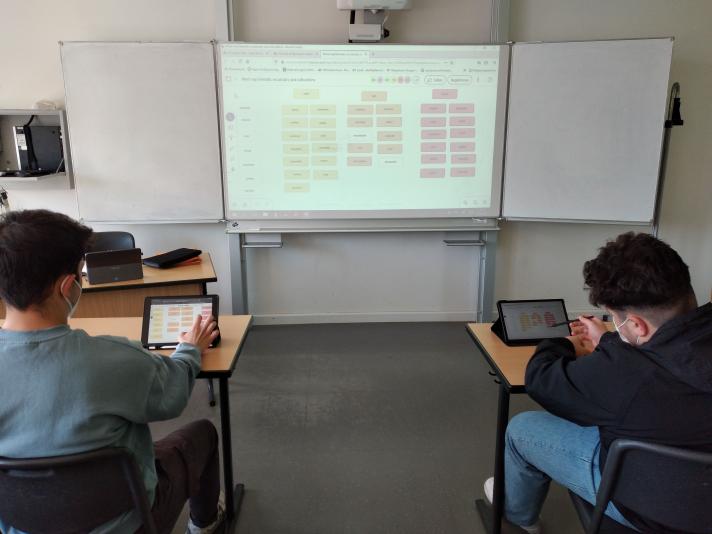Topic(s) addressed
In 2018, we at Helmholtz Gymnasium identified a great demand for advanced training in the area of ICT-competences, in the inclusion of the European intercultural perspective into our teaching, and in careers counselling/entrepreneurship education, all of which play an important role in the international job market that our students will need to compete in. It was our aim to intensify digital school development, to further promote the European perspective in our students, and to provide them with job market information and counselling appropriate for the 21st century. Regarding the specific development of ICT-skills, participating teachers were to acquire knowledge of theoretical concepts and practical expertise in the use of various technological tools and devices in the creation of innovative digital learning environments for students, in order to prepare them for the challenges of the 21st century.
Target groups
Project participants were all German women between the ages of 33 to 55, who taught a great variety of subjects (using 5 different languages) such as Drama, Religion, Mathematics, the Natural Sciences, Social Studies, Political Science, and Geography. Furthermore, many of them also taught in the school’s IB-Programme, and/or are heads of their respective departments, responsible for career counselling, aggression prevention and mediation.
Methodologies
Participating teachers gained deeper knowledge about a great variety of online teaching resources and proceeded to introduce them into their own and their colleagues’ classrooms. The use of online platforms and applications allowed for far more student cooperation in the creation of meaningful content, in both distance and blended learning. As an example, the practice of teachers providing vocabulary lists were now replaced by conjointly created online vocabulary sets (e.g. in quizlet.com) that facilitated collaboration, a more multidimensional approach to language acquisition through the possible addition of pictures and sound, and a more playful learning environment with automatically generated flashcards, matching, gaming activities, and so forth. Thus, the link generated between typical school work (formal learning) and play (informal learning) served to enhance student motivation immensely. The innovative learning approaches also augmented students’ awareness of their own training process and have greatly influenced the quality of materials conceived by them at our school. They actively intervened in that process, for example through online quizzes for their peers (e.g. in kahoot.it), or by joining the pan-European learning community in projects, as in the etwinning.net platform. Participation in international communal learning, in which students of one country and one school effectively teach others and learn from their peers in different countries, naturally led students to strive for perfection and to take pride in their achievements beyond the usual classroom environment. Two such projects are currently active in classes 7 and 10, with two more successfully completed last year.
Environments
Although this was not foreseen when the project was carried out, the results of the individual mobilities and their dissemination across numerous of our school’s departments have certainly had an enormous impact on the further enhancement of the school’s digital learning environment (as needed to meet the distance learning requirements that arose due to the COVID-19 pandemic since March 2020). The school’s digital infrastructure has since essentially improved. First of all, the introduction of a school-platform (HPI-Cloud) has facilitated cross-sectoral cooperation and communication among members of staff as well as between teachers and students. In addition to this, this platform has enabled all members of HHG teaching and non-pedagogical staff to offer online lessons and make good use of an easy exchange of working materials. Furthermore, the Erasmus+ project initiated a number of follow-up teacher trainings that resulted in the mixing of digital teaching and learning, with blended, distance, and in-class learning having gained a firm place in everyday school life at Helmholtz-Gymnasium. Thus, having gained a strong motivational boost from the Erasmus+ mobilities, our school can truly be considered an enabler of innovation that offers our students a modern and contemporary learning environment.
Teachers
At Helmholtz-Gymnasium, teachers who participated in the project were strongly involved in the dissemination process of innovative teaching and learning approaches with regard to the use of digital tools. To enable the participation of the entire school community, video tutorials created by project teachers were published on the school website to provide information on the use of educational applications. Regarding the dissemination of project results among school staff, a special training day for teachers from all of the school’s departments was organised by an expert group (which included several members who had participated in the Erasmus+ project). They made excellent use of their workshop experiences in the implementation of digital platforms and in teaching the use of various educational applications within the digital classroom. Additionally, the dissemination initiative from project teachers served as significant stimulus to boost the process of establishing a framework for future teaching and learning processes within the digital classroom (for example in the language departments). Collaborative work has truly been a cornerstone in this process, as the direct exchange of knowledge and expertise largely improved overall teaching and learning processes. Thus, the dissemination of project results was carried out in a cooperative way both during department meetings, as well as in collaborative planning sessions with teachers of the same grade. Besides, during an advanced teacher training session within the English department on the topic of English literacies in the digital classroom, (initiated by project participants), colleagues had identified criteria that may be used in the educational applications of foreign language learning, and critically assessed different educational applications regarding their (added) value when teaching specific literacies and discussing possible fields of applications.
Impact
Over the course of the project, the school acquired a number of interactive whiteboards and displays, resulting in almost half of the classrooms now in possession of one. Project members profited directly from their newly gained or deepened knowledge on how to integrate online resources into their classroom, and to also spread this knowledge to their peers through in-subject workshops. Since then, the acceptance and use of the interactive whiteboard have highly proliferated, especially in foreign language classes. In the latter, an ever-growing number of Internet tools are now in use in all classrooms, which clearly enhanced the possibilities and quality of language teaching at our school. Moreover, colleagues tend to turn much more naturally to Internet resources and are now able to create highly up-to-date teaching material on their own, which they are also equipped to share through the platforms. To further facilitate distance and hybrid learning during the recent pandemic, all teachers were recently equipped with personal tablets.
- Reference
- 2018-1-DE03-KA101-04681
- Project locations
- Germany
- Project category
- Secondary education
- Project year
- 2021


